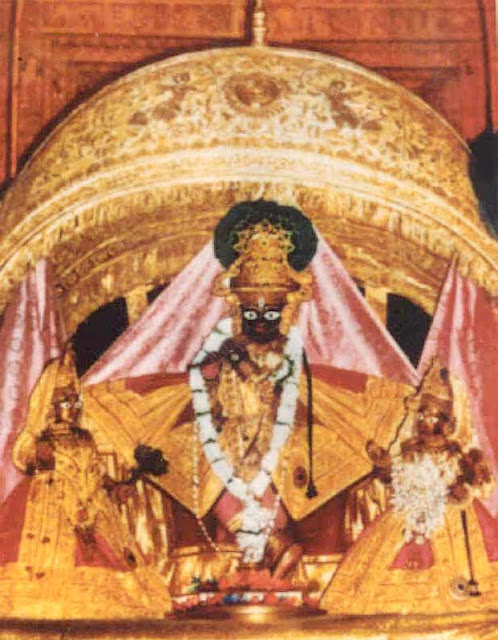Ecstatic Excursion to Rajasthan
On Tuesday 30 October I traveled with a group of twenty devotees from various nations on a pilgrimage organized by my wife to visit the three principle deities of Vrindavana: Madana Mohana, Govinda, and Gopinatha. All three of these deities were originally installed by Lord Krishna's great grandson, Vajranabha, 5,000 years ago. Over the course of time their worship was stopped and they were lost. However, during the time of Lord Caitanya these three deities were found and their worship was resumed with great devotion. In 1748 the envious Muslim tyrant Aurangzeb sent his soldiers to destroy the temples and deities of Vrindavan. Fortunately the devotees in Vrindavan received advance word of this evil plot and many of the deities, including these three were sent for safety to the care of Maharaja Jai Singh in Rajasthan.
Srila Prabhupada explains in his Caitanya Caritamrita purport (Adi 7.3):
"According to the Vedic principles, there are three stages of spiritual advancement, namely, sambandha-jnana, abhidheya and prayojana. Sambandha-jnana refers to establishing one's original relationship with the Supreme Personality of Godhead, abhidheya refers to acting according to that constitutional relationship, and prayojana is the ultimate goal of life, which is to develop love of Godhead."
Madana Mohana is predominating deity of sambandha. Govinda is the predominating deity of abhidheya. And Gopinatha is the predominating deity of prayojana. Therefore the worship of these particular deities is very helpful for the attainment of pure devotional service. This is why it is a very powerful spiritual experience to see these three deities, bow down at their feet, and humbly beg them respectively for sambandha, abhidheya, and prayojana. Our pilgrimage was a wonderful opportunity to do just that.
Sankarshan Das Adhikari
Srila Prabhupada explains in his Caitanya Caritamrita purport (Adi 7.3):
"According to the Vedic principles, there are three stages of spiritual advancement, namely, sambandha-jnana, abhidheya and prayojana. Sambandha-jnana refers to establishing one's original relationship with the Supreme Personality of Godhead, abhidheya refers to acting according to that constitutional relationship, and prayojana is the ultimate goal of life, which is to develop love of Godhead."
Madana Mohana is predominating deity of sambandha. Govinda is the predominating deity of abhidheya. And Gopinatha is the predominating deity of prayojana. Therefore the worship of these particular deities is very helpful for the attainment of pure devotional service. This is why it is a very powerful spiritual experience to see these three deities, bow down at their feet, and humbly beg them respectively for sambandha, abhidheya, and prayojana. Our pilgrimage was a wonderful opportunity to do just that.
Sankarshan Das Adhikari
Answers by Citing the Vedic Version:
Question: What Does Sankarshan Mean?
I know that Sankarshan is one of the names of Krishna, but could you please tell me what the name you have gotten Sankarshan Das Adhikari means?
L. Patel
L. Patel
Answer: One Who Attracts All Living Entities
Srila Prabhupada explains that Sankarshan is a name for Krishna, which means one who attracts all living entities. Das means servant. And adhikari means one who is empowered to preach Krishna consciousness.
Sankarshan Das Adhikari
Sankarshan Das Adhikari






Comments
Post a Comment